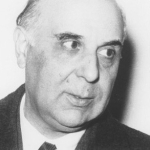Now as the farmer sits at his accounts
Reviewing fleeces neath deciduous beeches
And notes in red contented ink
Net profits of his quite impossible serenity;
As graded apples marketably beautiful
Into the bushel-baskets sink
And trussed hay to the tin roof reaches,
And where red tiles through darkening trees are reared
A whole year's work is sold in sacks of meal;
Now suddenly running
Drops like a sprig
Of oak in a gale on the neck
The little wriggler,
Vindictive-legged cunning,
Drops like a fleck
Of blood on a finger ring
Crooking in his sting.
It wriggles and stops,
Wriggles and turns
Through copper ferns
Through stubble of crops
Into the garden of his most impossible serenity.
Chrysanthemums
Wilt in alarm
As dangerous comes
Its arching arm
A probable harm
Nearer to his impossible serenity.
Brambles turn sour
Berries crinkle
All fruits,
Every flower,
All roots wrinkle:
The trees' atour
Lapses, and the power
Of his impossible serenity
Collapses.
The scorpion poison grips, its patterns spread
Like wine that trickling on a dusty floor
Hence and thence makes pellets and canals.
Asphodel, improbable, beside the river bed
Is found rank ramsons with a garlic smell.
And cider in a dirty cask, lovelike, turns vinegar.
Where had been pears and pippins, is a row of rotten balls,
Globes of mundungus, faced with foul fungus,
And locusts swarm to make the end complete.
The last bee disembowelled waves its dislocated feet.
Diseased the last elm falls, and with it falls
The indistinct last glint of Dionysus
Lysius.
Earth is with scorpions like spiders hung.
From every tile and brick they flick
Like leaping twisting mixing flies on dung.
A pretty virgin makes a pretty shrew,
As those lo longer virgins also do,
Because they are no longer so, or else because they are.
The fracasado, self-considering as from far,
By force of self-perverted scales
Pities himself for impotence, and rails
Oftener therefore: more he pities, more he fails.
The scolding wife drives man to keep a scolding whore:
If either dies, he grieves because she scolds no more,
And scorns the other still because she scolds.
The man whose one wife makes him ten cuckolds
Wishes the girl were plain: she finds no joys
In playing with her multiplicated boys,
Wishes herself plain too, to find her joy in one. Whose wife
Is dutiful and bashful all her life
Thinks he would be happier if she were loved by other men.
Surely some wit usurps the throne of Cypris, when
Woman so seems what never woman was,
For man to caper to as man should not.
The golden mean is not.
The man of business bonded to his trade
Postpones his culture till his fortune has been made.
The cultured man to realize his will
Can find no means, nor wherewithal to touch
His learning, since his culture costs too much.
Reformers, visionaries, poets, other such,
Because their vision real is, too sane their wit,
The multitude they seek to benefit
Lunatic calls them: and although they spurn
Others' opinions, lunatic for lack of heed they turn,
Parodying their visions of perfection.
The land, too stupid to desire a change,
Too lazy for that mental insurrection,
Yet knowing their salvation lies
In broader education
Like cats enough uneasy to surmise
They have the mange,
Further enlightenment refuses
And its chief men accuses
Of unenlightenment,
With consequent
Stagnation.
Over its losses
Autumn its mosses
Draws: the dormice go to sleep.
In the shorter afternoons
Determined to forget, the caterpillars crawl
Into the weak oblivion of cocoons.
To easier life the coward birds have all
Flown from the towns and woods and pools:
But some remain at large, poor ignorant fools.
The bats are wiser, who hang upside down,
Less crazily inverted than the town:
Snails in cement immure their sleepy souls:
Less mad, though timid, are the celibate
Ferns that abide the next arriving spring
To unroll fronds again, when warblers sing,
Meantime intelligently hibernate,
And delicately,
Up to date.
But we as leaves evacuate a lime
Cannot deceive ourselves nor bide our time:
Forced to retire by buds that seize our place,
Self-superannuated, in disgrace,
Know but too well that what we most deride
In others is the poison on our side,
Stung by the poison we ourselves put up
Ourselves the poisoned cup
We give our intellectual pride
To sup.
A scorpion drops from a unicorn's nape
Into the virgin's lap.
A scorpion drops from blood Xanthippê's tongue
And Socratês though he have wrung
A whole night's liquor from a score kulixes
And sadly his wine mixes,
Drinking all below the table,
Wanders, constitutionally unable
To drink himself unwise.
Yes, even him approaching now to weigh these things
The scorpion stings.
This belt of fretted stars that so promiscuously plays
Upon our eyes, we learn to name them all,
Picking our favourites out like horses in a race.
But now their steady passages recall
How, geared to the years,
They tick our lives out: and we cease to see
Much hope in false futurity:
Instead we falsify stars that have been
With promise that we alter since those stars,
Raising reality
Not in what we see,
Nor in what meteors there yet may be,
But in fixed stars we would we once had seen.












Comment form: